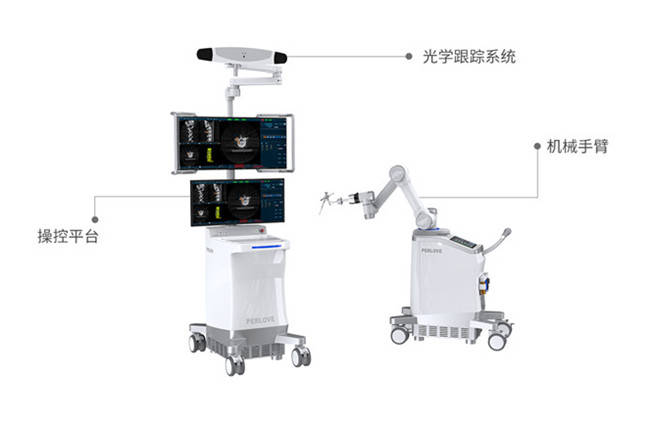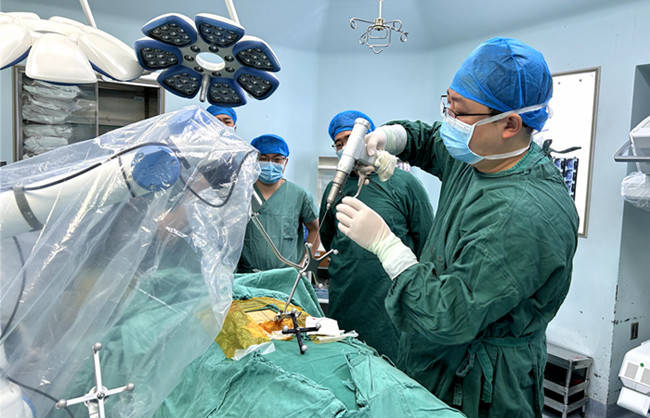Surgical robots are medical devices controlled and led by surgeons, assist doctors in clinical surgical treatment. Surgical robots are now widely used and fastest growing in five fields: lumpectomy, orthopedic surgery, panvascular surgery, transnatural cavity surgery, and percutaneous puncture surgery. The orthopedic surgery robot, also known as orthopedic surgery navigation and positioning system, consists of a host computer, a robotic arm, surgical planning and control software, an optical tracking system, a master control cart and a navigation and positioning toolkit, which can be widely used in multi-segment spine surgery to provide preoperative surgical flow planning, visual guidance of nail entry location and angle, simulation of nail entry assistance, etc. for spine surgery.

The main structure of Perlove orthopedic surgery robot
Is it good to use an orthopedic surgery robot for spine surgery? Here's an analysis of the pros and cons.
Advantages of orthopedic surgery robot-assisted spine surgery.
1. Accurate placement of surgical built-in objects
According to statistics, the accuracy rate of robot-assisted screw placement is about 96.9%, while the accuracy rate of experienced spine surgeons is about 92.7%. The orthopedic surgery robot significantly improves the accuracy of screw placement and reduces complications such as spinal nerve injury.
2. Reduced radiation exposure
With intraoperative 3D imaging, screws are placed only in the direction guided by the robotic guide pins, thus significantly reducing the radiation dose during surgery.
3. Reduction of surgery time
The robot reaches the surgical site through a minimally invasive incision with good accuracy in the planning of the surgery. Through the skilled operation of the surgeon and the accurate guidance of the orthopedic surgery robot, the operation time can be significantly shortened.
4. Reduced surgical incision
With accurate positioning of the orthopedic surgery robot, the surgeon only needs to make an incision in the small part of the positioning, while if the positioning is not accurate, the incision often needs to be enlarged to correct the change of position, and the surgery robot can also avoid the possibility of switching to open surgery for screw placement due to the difficulty of screw placement.

Application scenarios of Orthopaedic Surgery Robot
Disadvantages of orthopedic surgery robot-assisted spine surgery.
1. Increased cost
From the surgeon's point of view, the perioperative period will be extended, preoperative procedures will increase, more time will be spent during surgery, and some human errors may occur due to the use of computer systems and software operations, such as the inability to provide very clear CT images, poor data entry by the surgeon, and software updates, and learning curve problems for the surgeon. From the patient's point of view, more expensive procedures will be borne.
2. Still dependent on the physician
Even if patients pay more expensive surgery costs, theoretically they will achieve better surgical results, but the role of doctors is still very critical. Only experienced doctors can combine well with the robot and develop the best surgical plan according to the different conditions of each patient.
3. The effect still needs time to be verified
Robotic assistance does make spine surgery safer and simpler, however, it is still a new technology and the final results need time to be considered, and there are not yet a large number of postoperative follow-up reports for reference.
-
Perlove Medical at ECR 2026: Showcasing Cutting-Edge Imaging Solutions in Vienna
Read More » -
🌍 Elevating Global Healthcare | WHX Dubai 2026 Successfully Concluded
Read More » -
Join Us at ARAB HEALTH 2026 | See You in Dubai
Read More » -
Surgical Robots Take the Stage in the “Battle to Protect the Spine”
Read More » -
Application of 3D C-arm Imaging in Radiofrequency Ablation Treatment of Trigeminal Neuralgia
Read More » -
Correcting Limb Length Discrepancy | 3D C-arm Assisted Epiphysiodesis in Pediatric and Adolescent Patients
Read More »





